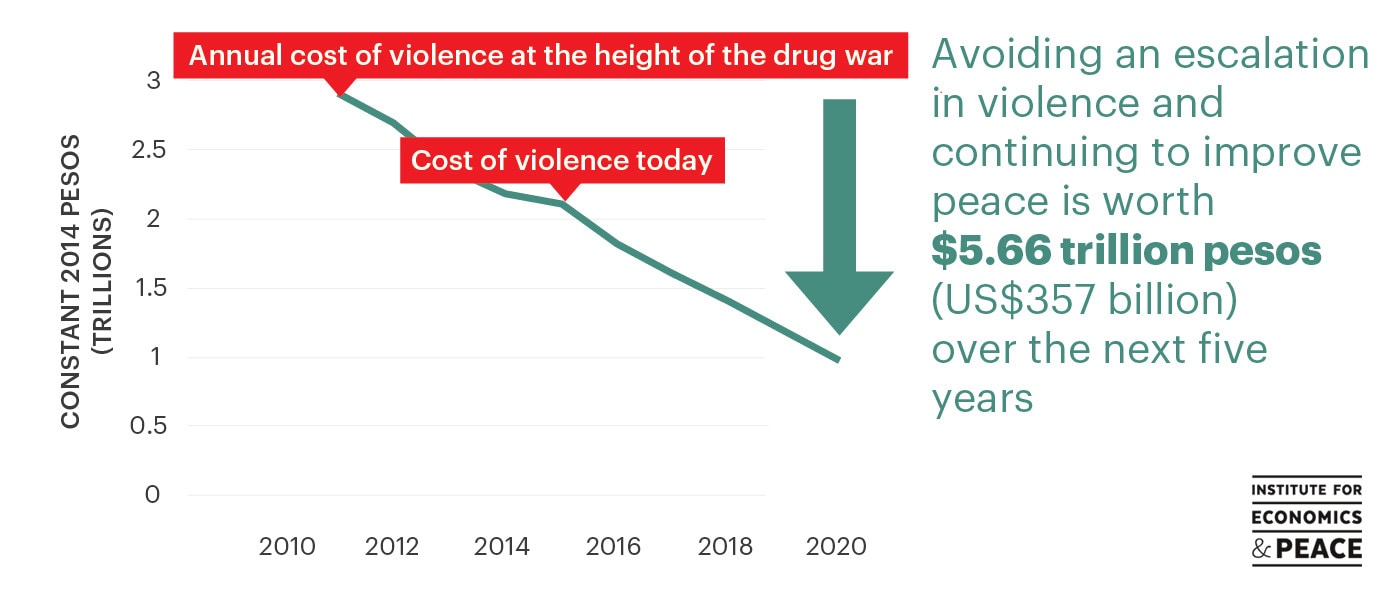This is how much violence costs Mexico's economy

A soldier walks past graffiti depicting angel wings in Ciudad Juarez, Mexico Image: REUTERS/Jose Luis Gonzalez

Get involved with our crowdsourced digital platform to deliver impact at scale
Stay up to date:
Latin America
The toll of violence in Mexico is usually counted in terms of the human and emotional cost, but as organised crime groups get rich on the suffering of others, the financial damage to the economy is also considerable.
According to the latest Mexico Peace Index, the total economic impact of violence in Mexico in 2015 was 2.12 trillion pesos (US$134 billion), around 13% of the country’s GDP. To break the figures down, that’s the equivalent of 17,525 pesos (US$1,105) per Mexican citizen, or about two months’ wages for an average Mexican worker. So as far as the nation’s economy goes, crime doesn’t pay.

Yet these figures actually represent an improvement on 2014, as a result of a decrease in violent crimes other than homicide. Last year, the increases in peacefulness not only reflected lower rates of violent crime, by 9.5 percent, but led to a tangible financial benefit with a reduction in the economic impact of violence of 96 billion pesos.
Overall improvement - but a sharp rise in murder rates
The pace of progress has slowed, however, due to a sharp rise in the rate of homicides in 2015 of 6.3 percent. The increase in the number of murders contributed an additional impact of 31 billion pesos to the Mexican economy, increasing the total annual cost of homicide from 696 to 727 billion pesos.
To identify the economic benefits that come from improvements in peacefulness, the Mexico Peace Index measures expenditures related to containing, preventing and dealing with the consequences of violence. It includes the direct and indirect costs of violence, as well as a multiplier effect to calculate the additional economic activity that would have accrued if the direct costs of violence had been avoided.
The height of the drug war
Looking back, we can see that the economic impact of violence increased from 2007 until it reached a peak in 2011, at the height of the drug war, when it hit 2.92 trillion pesos, the equivalent to 19% of Mexican GDP. From then, peacefulness improved and with it came the rewards, with the cost of violence dropping by 38%, or 802 billion pesos, from 2011 to 2015. That represented an improvement close to one and a half times the total agricultural output of Mexico in 2015.

The Mexican federal government’s expenditure on the military, domestic security and the justice system has steadily increased since 2003. In 2015, in constant currency, it spent 220 billion pesos or 1,818 pesos per Mexican citizen on keeping people safer. Military expenditure experienced the largest rise since 2003, tripling in constant currency terms in response to the rise in organized crime, and now representing 0.6% of GDP.
Curbing the cartels
Mexico has had success in lowering the activity of the cartels. The costs associated with organized-crime-related offenses improved for each of the last three years to 2015, with the cost of this group of crimes falling by 53%.
Despite that, the economic impact of extortions and kidnapping on the Mexican economy was 10 billion pesos in 2015, which does not account for the very large economic impact of organized crime, such as deferred investment and consumption and the potential flight of capital, or include drug-trade related economic activity, such as the production, transport, trade, supply or possession of drugs.
The Mexico Peace Index also calculates the indirect costs of violence, which are relatively high compared to direct costs. As an example, when a homicide is avoided, the direct costs, such as the money spent on medical treatment and a funeral, could be spent elsewhere. The economy also loses the lifetime income of the victim and the lost productivity of the pain and suffering of family and friends.
How the fear of violence affects business
The economic benefits from greater peace can therefore be significant. There is also strong evidence to suggest that violence and the fear of violence can fundamentally alter the incentives faced by business. Consequently, with greater levels of violence it is likely that we might expect lower levels of employment and economic productivity over the long-term, as the incentives discourage new employment creation and longer-term investment.
Beyond that, violence also affects economic development, including reduced productivity on the job, decreased investment and saving, distortion of government resource allocation and the flight of human and financial capital.
The positive news is that if the current five-year trend in peacefulness continues at the same rate in Mexico, not only will there be the human and societal benefits that come from a lowering of the levels of violence, but the economy is expected to save 5.66 trillion pesos (US$357 billion) over the next five years.
Don't miss any update on this topic
Create a free account and access your personalized content collection with our latest publications and analyses.
License and Republishing
World Economic Forum articles may be republished in accordance with the Creative Commons Attribution-NonCommercial-NoDerivatives 4.0 International Public License, and in accordance with our Terms of Use.
The views expressed in this article are those of the author alone and not the World Economic Forum.
Related topics:
The Agenda Weekly
A weekly update of the most important issues driving the global agenda
You can unsubscribe at any time using the link in our emails. For more details, review our privacy policy.
More on Resilience, Peace and SecuritySee all
Lisa Satolli
April 18, 2024
Kate Whiting
April 4, 2024
Spencer Feingold
March 22, 2024
Weekend reads: Our digital selves, sand motors, global trade's choke points, and humanitarian relief
Gayle Markovitz
March 15, 2024
Kalkidan Lakew Yihun
March 11, 2024
Liam Coleman
March 7, 2024






